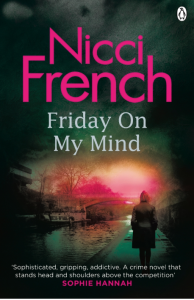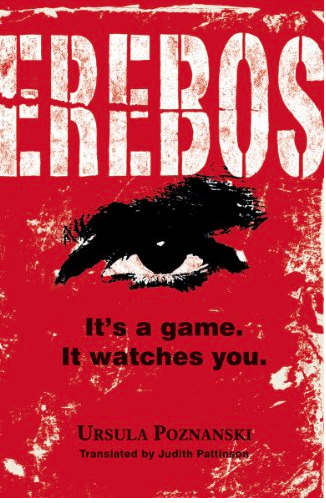





I went over my stacks of read books during German Literature Month and was startled when I noticed how many books, especially thriller and crime novels, I had read but not reviewed. I could probably write longer posts but decided to write a few very short reviews instead. That way, you might still hear about a book worth reading or one you should avoid and I don’t have to post every single day until the end of the year.

Renée Knight’s Disclaimer is possibly the thriller disappointment of the year. The premise was interesting – a woman receives a novel in which the authors describe something that happened a long time ago and that she never told anyone. I think the book has two major flaws. One is that it’s not believable. I hate it when plot relies on one character suspecting another without questioning things. That alone would have annoyed me but I also thought the story was highly unbelievable. Sometimes a book can be salvaged through great atmosphere and description. Not so this novel. In my opinion that’s the second flaw of Disclaimer. While it’s said to be set in London, it might as well have been set on the moon. Not once did I see the city. Unbelievable story, wonky psychology, and zero atmosphere.

Murder on the Orient Express was another disappointment. I picked it because I was in the mood to read a locked-room mystery and because I haven’t read any Agatha Christie in a long time. So far I’ve only ever read her standalone novels and one or two Miss Marple novels. While they might be formulaic, I still really enjoyed them. This was my first Hercule Poirot. I never picked them up because for me, as a native French speaker, the name is so silly. It sounds like poireau – leek – or poivrot – drunkard – . Plus Hercule? Really? I expected him to be on the boring side and that’s what he is. I wasn’t fascinated by his deductive skills. Still, it was a quick read and I loved the setting. I only found the murder and the way it was solved a bit lame. Still, if you like a great setting – a train in winter – and are in favour of cozy crime and whodunnits – especially locked-room mysteries – this might be for you.

The Ice Twins had a lot to offer. Stunning descriptions and atmosphere. After the death of one of their twin daughters, Angus and Sara Moorcroft move to a remote Scottish island. Such eerie, creepy descriptions and certainly not a place I would have chosen to live in, after the awful loss of a child. It gets creepier when the surviving twin begins to claim that she’s the other one. The part that affected me the most and which is the creepiest is the favouritism. While the father openly preferred one kid, the mother preferred the other. What does it mean, when you suddenly think that it’s not your favourite who has survived? The Ice Twins was psychologically compelling. The descriptions are great. Unfortunately the end was a bit of a disaster. Not only was it disappointing and far-fetched, I also found it misogynistic. When I bought the book, I thought S.K.Tremayne was a woman but after finishing, I started to doubt that. And indeed, S.K. Tremayne is a man. I’m not surprised. The ending leaves no doubt.

With Karin Slaughter’s standalone novel Cop Town I finally enter the territory of the books I loved without reservations. Like Nicci French or Sarah Bolton, she is one of my favourite mainstream crime writers. I’ve been reading her series for years, but when I heard she’d written a standalone novel, set in the 70s in Atlanta, I was interested immediately. What sounded particularly great was the research she’d done for this book. The period details are amazing. Her choices of two female protagonists make this a very feminist novel, as it’s in part a murder mystery – there’s a shooter killing cops – and a book about women on the police force, a workplace that’s dominated by white males who are sexist, racists, anti-Semites, homophobic . . . you name it. Into this explosive environment comes Kate, a rookie cop. She’s recently widowed, her husband died in Vietnam. Kate comes from an upper-class, Jewish family. The Vietnam angle, is another well-done angle. Her first day is a shocker, but to the surprise of everyone, even her partner Maggie, she doesn’t give up. Maggie comes from a cop family. Her uncle and her brother have joined the force. They both didn’t want her to follow them in their footsteps and the aggression and violence she has to endure, are appalling. Notably her uncle Terry is the prototypical male white homophobic sexist racist. The shooter’s been active for a while, which infuriates the cops and even leads them to plant false evidence. Maggie and Kate decide to take matters into their own hands. A dangerous idea. Slaughter’s writing is tight, as usual, the period details so well captured, the story is gripping. A remarkable achievement. It works as a crime novel and as a novel on the 70s, Atlanta, gender issues . . . It’s shocking to think what women had to put up with to fulfill the dream of working in a male dominated job. A word of warning—I’m not the most squeamish but there’s some violence in this book that was very hard to read and get out of my mind again.

Everyone reading this blog knows how much I love the author duo Nicci French. I’m slowly reading my way through their novels. Surprisingly I wouldn’t have heard of Until It’s Over, if it hadn’t been mentioned by one of my readers a year ago (I’m really sorry I can’t remember who it was). I got it back then and kept it for later. A while ago, I read a review of it and that’s how I remembered I had it on my piles. I’m glad I read that review before reading the book because, with the wrong expectation, I might have been disappointed. They did something very unusual here. They wrote two distinct parts. Part one is told from the point of view of London Cycling Courier Astrid, part two from the point of view of the perpetrator. It wasn’t easy to adapt to part two because I loved part one so much. Astrid lives together with a group of friends in an old house, in an area of London that hasn’t bee gentrified yet. Suddenly people around her are murdered. What has it got to do with her? While the story is suspenseful, it’s not what I liked best. I liked to read about this group of friends who share a house. Loved the setting, which Nicci French captures so well- the bars, the parks, the houses. London is as much a character as the people. Part two is very good too, but I would have loved to go on reading from Astrid’s point of view. Once I had gotten used to the new narrator, I liked part two almost as much. I’ve read a lot of Nicci French’s novels. Some I loved, some I found OK; this was one of the best.

The Chemistry of Death is another book that has been lying on my piles almost since it came out. For some reasons, I didn’t think I would like it because I got a bit tired of serial killer novels. In theory I would like them, because, for me, a great serial killer novel is like a realistic ghost or horror story. That’s why setting, atmosphere and mood are so important in this subgenre. Sadly, many authors just use the trope to avoid to have to dig for good reasons for murder and many of those “products” are as far from psychologically compelling as can be. However, there’s one thing I don’t like even in the best serial killer books —the showdown ending. All these books get frantic towards the end and there are recurring elements that are frankly annoying – e.g. hero/heroine tries to avoid killer and runs right into his arms. While The Chemistry of Death does have a formulaic ending, the rest of the book is so astonishingly well done, that it hasn’t only become one of the favourites of this year but I think it’s possibly one of the best crime novels I’ve ever read. I loved the mourning, depressed narrator, loved, the almost gothic descriptions of murder scenes and locations. The atmosphere is brooding, haunting. Don’t be put of by the serial killer thing— this is so well written and atmospheric, it would be sad to miss it.
Have you read any of these? Does anyone know a good locked-room mystery?












